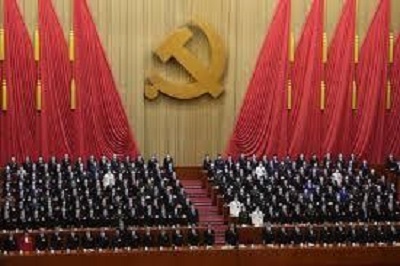Context-
The upcoming Third Plenum of China’s 20th Party Congress, scheduled from July 15-18, is attracting significant global attention. Commentators, especially in the West, hope this event might signal a shift in China’s policies and direction.
Western Perspective on China and Russia
- Changing Global Dynamics : Western commentators have long argued that the optimistic vision of the post-Cold War era is outdated. They believe that Moscow and Beijing, along with their allies, are unlikely to become responsible stakeholders within a rules-based international order.
- Expectations from the Third Plenum : Against this backdrop, the Third Plenum of China’s 20th Party Congress is being closely watched for any signs of a thaw in China’s approach. The pessimism in the West is rooted in the belief that China will not embrace the idea that global security is interconnected. However, China’s history of unexpected moves leaves room for surprise.
Economic Concerns and Speculations
- Perception of Economic Decline : There is a widespread belief in the West that China’s economy has peaked, particularly after the adverse effects of the ‘Zero COVID’ policy. The perception of an economic decline fuels speculation that the Third Plenum might herald significant reforms.
- Importance of the Third Plenum : Historically, Third Plenums are crucial as they set the economic strategy for the next five to ten years. The anticipation is that this Plenum might pave the way for China’s rapid progress, despite current appearances suggesting otherwise.
Historical Context of the Third Plenum
- Past Reforms : The Third Plenum has a storied history in China’s economic reforms. The 1978 Third Plenary Session of the 11th Party Congress, where Deng Xiaoping introduced significant economic reforms, is particularly notable. This session set China on a path of economic resurgence.
- Advancement of the Plenum Date : The advancement of the Third Plenum’s date this year, typically held in October or November, has intensified speculation about potential sweeping reforms.
China’s Economic Challenges
- Structural Issues : China faces several economic challenges, including an aging population, a shrinking workforce, high levels of debt, and persistent economic issues despite implemented measures. This situation has led to widespread pessimism within China about its future.
- Hopes for New Guidelines : There is hope that the Plenum will introduce new guidelines to reassure both the Chinese population and the international community about the country’s economic health.
- Skepticism About Leadership : Outside experts remain skeptical about whether the current leadership will introduce new ideas at the Plenum. Xi Jinping, China’s ‘Maximum Leader,’ is unlikely to make admissions similar to Deng Xiaoping’s acknowledgment of past errors. Such an admission could undermine Xi’s authority and prospects.
Western Allegations and China’s Intentions
- Persistent Allegations : Western skepticism about China extends beyond economic concerns. Allegations of ‘gray zone coercion’ tactics, including disinformation campaigns, interference in elections, and military provocations, persist.
- Regional Threats : The threat to Taiwan and other countries in the South and East China Seas remains a focal point of China’s military and propaganda efforts. This perception fuels paranoia about China’s intentions, especially in Asia.
- Global Initiatives : China’s Global Development Initiative (GDI), Global Security Initiative (GSI), and Global Civilization Initiative (GCI) encapsulate many of its beliefs, leaving little room for adjustment.
- National Security Elevation : Xi Jinping’s elevation of national security to the highest level has increased paranoia about China’s intentions. This approach adds flux to an already complex regional and global situation, posing a dilemma for policymakers in neighboring countries like India.
India-China Relations
- Strained Relations : India’s relationship with China has been strained, particularly since 2020, due to tensions along the China-India border. Despite India’s willingness to show flexibility, China demonstrates little willingness to compromise.
- Hardening Attitudes : Both nations appear to be hardening their attitudes, leading to increased scrutiny of China’s military capabilities, including its missile and nuclear inventory.
- Military Capabilities : India’s strategic community continues to highlight the threat posed by China’s Rocket Force and advancements in space and electronic warfare.
- Preparation for Confrontation : There is a broad consensus that India should prepare for potential confrontation, taking adequate steps to counter any aggressive moves from China.
Diplomatic Solutions and the Role of India
- Potential for Diplomacy : The question remains whether confrontation with China is inevitable or if diplomatic efforts can deflect China’s aggressive intentions. Despite the relative difference in force structures, diplomacy could help avoid misadventures due to miscommunication.
- Lack of Positive Response : However, there is little indication that China would respond positively to such overtures, given its hard-line stance.
- India’s Strategic Position : Today, India is in a strong position to take the initiative in its relationship with China. As it stands on the cusp of becoming a major power, India’s economic parameters are among the best globally. With strong leadership and international friendships, an initiative from India would not be seen as a sign of weakness but rather as a major step towards global peace.
Historical Precedents
- Past Initiatives : India has taken the initiative in the past with notable outcomes. The path-breaking visit of Prime Minister Rajiv Gandhi to China in 1988, and his discussions with Deng Xiaoping, ensured almost three decades of peace.
- Current Opportunity : The current situation, while tense, offers an opportunity for India to embark on a new grand initiative.
Conclusion
The upcoming Third Plenum of China’s 20th Party Congress holds significant implications for China and the world. While there is hope for a change in direction, the outcome remains uncertain. With its strong strategic position, India has an opportunity to take a proactive stance, potentially steering the course toward peace. The Plenum might provide the necessary impetus for such an initiative, benefiting India, China, the broader region, and the world.
|
Probable Questions for UPSC Mains Exam-
|
Source- The Hindu







